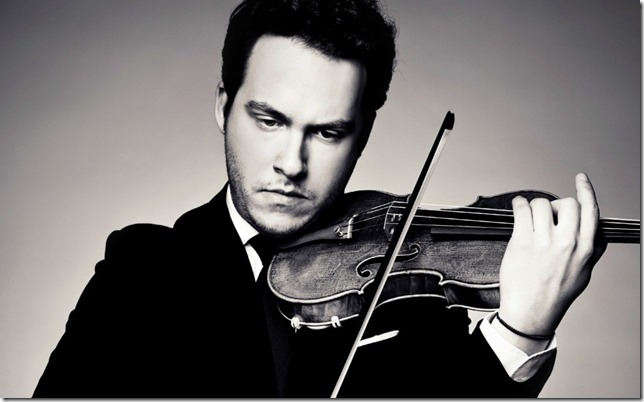Giora Schmidt. (Photo by Dave Getzchman)
The fourth and last conductor to meet the public in the Atlantic Classical Orchestra’s search for a permanent music director was David Handel, who on Wednesday led the most ecstatic evening so far in terms of audience response with violinist Giora Schmidt, who received a long standing ovation after completing the first movement of the Tchaikovsky Violin Concerto.
I have never seen an Eissey Theatre audience react to a soloist so positively; their reception defied convention as they applauded his playing and technical skills with wild abandon for at least five minutes. When the din stopped, the soloist was astonished. He jokingly reminded them there were two movements to go.
Tchaikovsky had intended his 1878 concerto for Leopold Auer, who declared in “unplayable.” It got its first hearing in 1881 with Adolf Brodsky, and Auer spent the rest of his life backtracking from his initial opinion. Schmidt, 33, who was born in Philadelphia, made the difficulties of this concerto sound like polished passages meant to be blended with the whole.
Schmidt’s earliest phrases were a little rushed, but he soon settled down, displaying his strong technique in the famous main theme that has helped to make this concerto so popular. His difficult octave jumps were executed to perfection, and in the cadenza, he took it securely and deliberately, mapping out one of the finest Tchaikovsky cadenzas I’ve ever heard. It was a brilliant display of his flawless technique. I thought the audience would applaud then and there his playing was so riveting.
His final runs up to the end of this movement were superb, and before the last note the audience members were on their feet en masse, cheering their lungs out. It was an incredible performance and the acclaim was well-deserved.
In the slow movement, digging deep into the music, he bent down, his nose almost touching his knee. Oh, dear, I thought, showmanship will get the better of him, but he realized this and gave up the urge. The mark of a true professional. Playing a new and beautiful melody accompanied by clarinets, flutes, later joined by oboes and bassoons, Schmidt captured an air of reverie.
Schmidt and the ACO took the finale at breakneck speed, beautifully playing off each other, and the final bars were thrilling, as the soloist attacked it with a spirit of dancing and risk. Following another round of applause, Schmidt played a movement from one of the Bach partitas as an encore. 
David Handel. (Photo by Ruslana Studio)
Beethoven’s Symphony No. 8 (in F, Op. 93) was the second piece on the program. Written in 1811-12, it got its first performance in Vienna under Beethoven in 1814. By this time his deafness and family troubles were heaped around him, but what is not as well-known is that during this time he was involved with his “Immortal Beloved,” whom scholarly consensus now believes to be Antonie Brentano.
Antonie returned his love, and offered to leave her husband and children to be with him, but the composer could not bring himself to let her do so. Given all this heartache, one would expect a work full of drama and pathos. But the Eighth is full of bright, witty and humorous music.
Beethoven dispenses with the usual slow serious introduction, and David Handel brought down his baton on a crisp, lively first movement. (I also liked that he separated the first and second strings sections with a clear passage between the two, which provided a swifter exit for soloist and conductor.) The central musical passages have many repeats, but there was an imbalance from the point at where he chose to locate the horns, behind the double basses. It sounded heavy even in the quiet ending.
Matters of balance improved in the second movement, with violins weaving a light tune around the horns and bright playing from the winds. Beethoven resorts to the older minuet form for the third movement, in which the strings happily sawed away and horns played sweetly. In the finale, the trumpets were too loud, it seemed to me, though the rest of the brass section played with a nice even roundness.
The symphony came off somewhat heavily, it seemed to me, which may have been conductor Handel’s way of the deeper sad feelings underneath the surface merriment of this work.
The program opened with a short piece by Chilean composer Alfonso Leng (1884-1974). Called Andante for Strings, it opens elegaically with fresh-sounding strings, more in the mood of Elgar’s Chanson de Matin than Wagner’s lush Wagnerian musical language, said to be Leng’s influence.
It has warm depth in the lower register with the occasional rising scale ending each musical phrase. Lovely crescendos bring it to a close all too soon, leaving us wanting more as we hear the last four notes. Using only his hands, David Handel conducted it with calm sensitivity.
